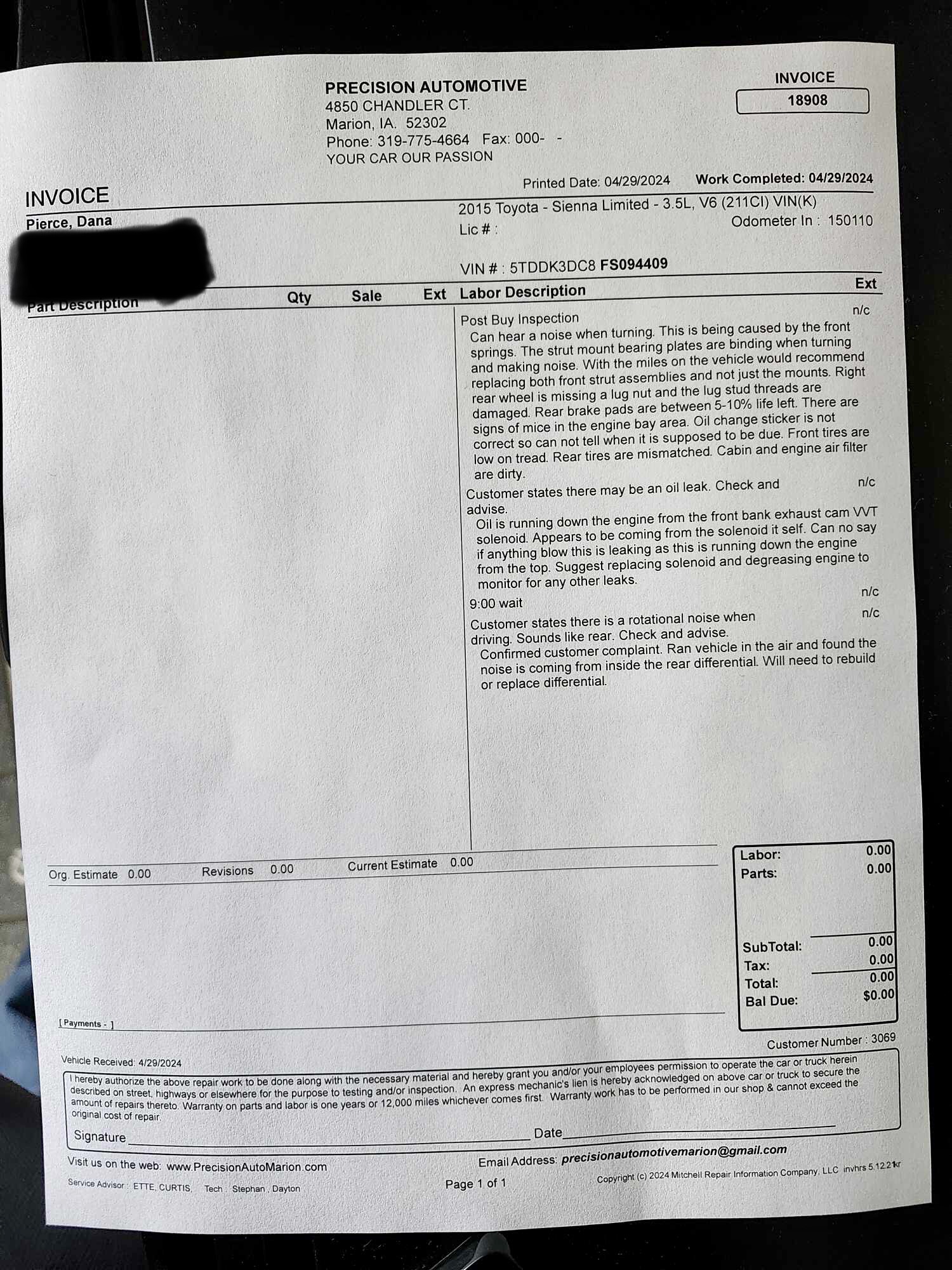- Report: #938625
Complaint Review: BDL LLC - Scottsdale Arizona
Reported By:
Libby -
Scottsdale, Arizona, United States of America
Submitted:
Updated:
BDL LLC
12185E Arabian Park Drive Scottsdale, 85259 Arizona, United States of America
Phone:
Web:
Categories:
BDL LLC Elizabeth Muelhaupt Took cash from Debt Relief company customers and used it to degend against AZ AG Scottsdale, Arizona
Report Attachments
×

After shutting down the Mortgage Company in July of 2010, Elizabeth Muelhaupt and Bruce Spurlock continued running customer money to the tune of over $200,000 and used this money to open another business with Dallas Cawley, a credit card debt settlement company and they ripped everyone off and used the money to pay their lawyers for the Arizona AZ AG and the fine and penalties to the State. They both moved assets around and lied on their finacial declarations to the State AG. But here is what is even better. After the divorce, things with Libby Elizabeth Muelhaupt have gotten progressively worse. Libby Elizabeth Muelhaupt's daughter their eight year old daughter, apparently has been molested by Libby Elizabeth Muelhaupt's live-in boyfriend, Paul Piermarini Piermarini. Paul Piermarini has a long criminal record and is a self confessed rock cocaine addict. He has been a family friend for more than five years.
He and Libby Elizabeth Muelhaupt have been involved since January of this 2011 and he officially moved into the house in May of this 2011.
Libby Elizabeth Muelhaupt daughter told her mother about the molestation back in early August 2011 in front of her sister and her brother. The nanny was informed also. Libby Elizabeth Muelhaupt told the children that she had contacted Cathy Rosick (who has been the child therapist for both Libby Elizabeth Muelhaupt's daughters since October of 2010) and that Cathy was "taking care of it".
When John found out from his oldest daughte, John immediately contacted Cathy, she told John that Libby Elizabeth Muelhaupt had never spoken to her about Libby Elizabeth Muelhaupt daughter's allegations of molestation by Paul Piermarini.
In fact during Libby Elizabeth Muelhaupt's daughter's therapy session on October 18th, 2011,Libby Elizabeth Muelhaupt's daughter told Cathy that she been molested by Paul Piermarini. Cathy immediately contacted the Scottsdale Police Department, and a Scottsdale police detective contacted Libby Elizabeth Muelhaupt a week later. As John mentioned Paul Piermarini has a long criminal record, he has two outstanding warrants against him, and most recently served 30 days in jail when he was picked up on one of the out of State Warrants, this occurred just this last August. The State of MA failed to extradite him on the Warrant, as a result, after serving 30 days Paul Piermarini was released and moved back into the house with Libby Elizabeth Muelhaupt and the children. While Paul Piermarini was in jail he made more than 290 collect calls from Maricopa County Jail to Libby Elizabeth Muelhaupt. Paul Piermarini is a self-confessed rock cocaine addict. At the end of September 2011 Libby Elizabeth Muelhaupt discovered that Paul Piermarini had stolen more than $20,000 from her, and kicked him out of the house,
but he was allowed to move back in a few days later. According to Paul Piermarini he would leave Libby Elizabeth Muelhaupt's house late at night purchase crack cocaine go back to the house get high, Libby Elizabeth Muelhaupt did not care because she would be drunk sitting at the computer.
Both Libby Elizabeth Muelhaupt and the nanny Melanie Mattina were aware of Libby Elizabeth Muelhaupt's daughter's allegations regarding Paul Piermarini's molestation of Libby Elizabeth Muelhaupt's daughter since the beginning of August, however they elected not to do anything about it. In fact Melanie apparently told Libby Elizabeth Muelhaupt that as the Nanny she was obligated to report it. Unfortunately Melanie is six months pregnant with an eight year old son and needs the paycheck and health insurance Libby Elizabeth Muelhaupt provides for her. Libby Elizabeth Muelhaupt apparently
threatened her with instant dismissal and no severance. After Libby Elizabeth Muelhaupt found out about the molestation from her daughter in August of 2011, she kicked Paul Piermarini out of the house but he moved back less than a week later.
John took custody of his oldest daughter on November 1st 2012. Paul Piermarini called John and said that Libby Elizabeth Muelhaupts alcohol abuse had worsened and Libby Elizabeth Muelhaupt had told him that she wanted Jacqueline to live with John. Over the past year there many occasions when the oldest daughter was misbehaving that Libby Elizabeth Muelhaupt would call John in front of her and state that she wanted her to live with John unless Jacqueline modified her behavior. John's oldest daughter told John about Libby Elizabeth Muelhaupt's daughter's allegations, because it was bothering her. John's daughter was visibly upset and she even described in great detail what Libby Elizabeth Muelhaupt's daughter (her sister) had said had occurred with Paul Piermarini, she had to stop because she was crying.
John immediately called Libby Elizabeth Muelhaupt daughters therapist Cathy Rosick, Cathy informed John that Libby Elizabeth Muelhaupt had never contacted her regarding this. Cathy learned of the molestation from Libby Elizabeth Muelhaupt's daughter during a therapy session with Libby Elizabeth Muelhaupt daughter on October 18th. Cathy immediately called Scottsdale Police department and filed a report. Cathy also said that in the many sessions that occurred since August, when Libby Elizabeth Muelhaupt dropped the girls off for therapy not once did Libby Elizabeth Muelhaupt bring up that Libby Elizabeth Muelhaupt's daughter had alleged that Paul Piermarini was molesting her. Cathy in fact had many one on one meetings with Libby Elizabeth Muelhaupt, to discuss the girls therapy progress and not once did Libby Elizabeth Muelhaupt bring up the issue of molestation. Libby Elizabeth Muelhaupt daughter's allegations of molestation, only came up during Libby Elizabeth Muelhaupt daughter's therapy sessions on October 18th. As result of Libby Elizabeth Muelhaupt daughter's allegations Cathy immediately contacted Scottsdale police department. Essentially Libby Elizabeth Muelhaupt had known about this since early August and chose to do nothing about it, even though the children were having weekly therapy sessions with Cathy. After speaking with Cathy in November of 2011, John then called Libby Elizabeth Muelhaupt and spoke with her regarding Libby Elizabeth Muelhaupt's daughter's allegations. Libby Elizabeth Muelhaupt admitted to their daughter telling her about the molestation in August 2011, but she did not tell John that SPD had been in contact with regarding this. However she chose to do nothing about it and Paul Piermarini continued to live at the house. It was not until in September of 2011, when Libby Elizabeth Muelhaupt discovered that Paul Piermarini had stolen more than $20,000 from her did she kick him out of the house, but Paul Piermarini was then allowed to move back in less than ten days later. However, she did nothing to report Libby Elizabeth Muelhaupt daughter's allegations, neither did she contact Libby Elizabeth Muelhaupt's daughter's child therapist.
In speaking with Cathy the girls' therapist, Cathy believes that these allegations might be real and as a result she contacted Scottsdale Police Department.
John met with Cathy and she told John that the molestation according to Libby Elizabeth Muelhaupt's daughter also involved not only her but the couples three year old daughter daughter also.
Paul Piermarini and John believe it or not, were best friends, over the years of knowing him, John understood that people make mistakes and he was trying to stay clean. Paul Piermarini did a lot of work at the house and his company offices and construction and remodeling. He was over their house for many weekends, Sunday brunches, dinners, Thanksgivings and Christmases. John never left him alone with the kids.
After the divorce, Libby Elizabeth Muelhaupt relied on Paul Piermarini helping her with the kids more and more. Until literally he was there all of the time, looking after the kids when the Nanny left, going to the store, even babysitting the kids and eventually he ended up staying the night. He felt badly for the kids because their mother once drunk, was incapable of looking after them. According to Paul Piermarini Libby Elizabeth Muelhaupt's drinking has gotten worse. And he was there more than anything to help her out with the kids so that she could sleep until noon, he would get the kids up early in the morning, breakfast, ready for school, Paul Piermarini is now open about the true nature of the relationship that he and Libby Elizabeth Muelhaupt had. He has been very clear about the fact that he was only there for the money so that he could buy his drugs and very often he got high in the house while Libby Elizabeth Muelhaupt was getting drunk while the kids were there. Eventually their relationship progressed from just friends to something more. He said that Libby Elizabeth Muelhaupt did not care about his drug use and drug addiction, in fact there were many occasions when Libby Elizabeth Muelhaupt would drink and use crack cocaine with him, and that they would often have sex while getting high. As long as he was there to help care for the kids while she was drinking and sleeping. In fact when Paul Piermarini had stolen money from his brother (Dominic Piermarini) to purchase drugs, in May of this 2011, John told Libby Elizabeth Muelhaupt about it and she did not care. She just told John to mind his own business.
Paul Piermarini of course, is denying the allegations of molestation, he is trying to stay clean, and is determined not to lie and tell the truth and be honest regarding his relationship with Libby Elizabeth Muelhaupt. As result he's being very open to John regarding his relationship with Libby Elizabeth Muelhaupt, her drinking and his and her drug use and sexual relationship during their time together. They even went together to meet Paul's drug connection Jamaica to buy crack cocaine. During a court hearing in May 2012, Libby Elizabeth Muelhaupt admitted to Jamaica coming by the her house in Scottsdale. When the Scottsdale Police Detective contacted Libby Elizabeth Muelhaupt regarding Cathy Rosicks report, Libby Elizabeth Muelhaupt told Paul Piermarini that Libby Elizabeth Muelhaupt daughter had reported the molestation allegations to the therapist, Paul Piermarini moved out of the house, and he immediately left town and went to Boston Massachusetts, within days of the Detective contacting Libby Elizabeth Muelhaupt. Paul Piermarini and John remained in constant contact during the last year, talking to four to five times a day, John even paid him to help Libby Elizabeth Muelhaupt with the kids, at that time, he portrayed his relationship during the past year as that of family friend, brother and sister with Libby Elizabeth Muelhaupt, and was purportedly working with Libby Elizabeth Muelhaupt toward reconciliation and counseling with John. Since the allegations of molestation Libby Elizabeth Muelhaupt has been in constant contact with Paul Piermarini, concerned about his reaction and what John might do. She has been threatening Paul Piermarini with criminal prosecution for stealing the money, if he reveals anything to anyone regarding what happened in the family home during their time together. However, as part of his rehabilitation of staying clean of drugs, Paul Piermarini is determined to tell the truth and be honest with everyone around him. When Libby Elizabeth Muelhaupt learned that John had found out about their children being molested, she immediately contacted her lawyer Jami Wilenchik and is now lawyered up.
powered byCustom Search Web
View Case
Cited Cases
Citing Cases
Comment (0)
| Follow Leagle on Twitter
IN RE MARRIAGE OF MUELHAUPT439 N.W.2d 656 (1989)In re the MARRIAGE OF Frances Ellen MUELHAUPT and Joseph Daniel MuelhauptUpon the Petition of Frances Ellen Muelhaupt, Appellee,And Concerning Joseph Daniel Muelhaupt, Appellant.No. 87-1336.Supreme Court of Iowa.April 19, 1989.Rehearing Denied May 12, 1989. Randall G. Horstmann of Nyemaster, Goode, McLaughlin, Emery & O'Brien, P.C., Des Moines, for appellant.Verne Lawyer and Richard H. Doyle IV of Law Offices of Verne Lawyer, Des Moines, and Harlan M. Hockett, Des Moines, for appellee.Considered by HARRIS, P.J., and LARSON, CARTER, NEUMAN, and SNELL, JJ.
HARRIS, Justice.This is an appeal and cross-appeal from the economic provisions of a dissolution of marriage decree. Substantial property rights are involved. Our de novo review leads us to modify and affirm on both appeals.Frances Muelhaupt (Frances) and Joseph Muelhaupt (Joe) were married in 1966. They had three children: Elizabeth; Daniel; and Heidi. By a prior marriage Frances had a son, Aaron, whom Joe adopted. Frances, forty-four years old at the time of trial, never finished high school and had not worked outside the home for more than twenty years. Joe, forty-eight years old at the time of trial, has a college degree in business. He is vice president of Des Moines Cold Storage Co., Inc. (DMCS), a closely held corporation. His annual salary is $92,500 per year, but in 1985 his total income was $196,931. Frances has had a falling out with the children except for Aaron. The children live with Joe when not in school.The case was extremely bitter and hard-fought. After a bench trial the court awarded joint legal custody of Heidi, the only minor child, to the parties and granted physical care to Joe. Heidi has since turned eighteen. Frances was ordered to pay child support of $100 per month until Heidi became eighteen, plus $100 per month per child for post-high school education while the children are actually in school. Joe was ordered to pay $2500 per month in alimony until Frances dies, remarries, cohabitates, or the year 2007.I. Criteria for dividing property between parties to a marriage dissolution are set out in Iowa Code section 598.21(1) (1987). It provides:(a) the length of the marriage;(b) the property brought to the marriage by each party;(c) the contribution of each party to the marriage, giving appropriate economic value to each party's contribution in homemaking and child care services;(d) the age and physical and emotional health of the parties;(e) the contribution by one party to the education, training or increased earning power of the other;(f) the earning capacity of each party, including educational background, training, employment skills, work experience, length of absence from the job market, custodial responsibilities for children and the time and expense necessary to acquire sufficient education or training to enable the party to become self-supporting at a standard of living reasonably comparable to that enjoyed during the marriage;(g) the desirability of awarding the family home or the right to live in the family home for reasonable period to the party having custody of the children, or if the parties have joint legal custody, to the party having physical care of the children;(h) the amount and duration of an order granting support payments to either party pursuant to subsection 3 [criteria for support payments] and whether the property division should be in lieu of such payments;(i) other economic circumstances of each party, including pension benefits, vested or unvested, and future interests;(j) the tax consequences to each party;[ 439 N.W.2d 659 ] (k) any written agreement made by the parties concerning property distribution;(l) the provisions of an antenuptial agreement;(m) other factors the court may determine to be relevant in an individual case.There is no dichotomy between the statute and former or existing case law; most of the statutory guidelines could be gleaned from our cases. See, e.g., Marriage of Thomas,319 N.W.2d 209, 210 (Iowa 1982).Especially significant here is Iowa Code section 598.21(2). It requires that property given to or inherited by either party ordinarily is to be considered the property of that party. This subsection does not demand that property acquired by gift or inheritance must always be set aside to the donee and omitted altogether from consideration in the division of property. To avoid injustice property inherited by or given to one party may be divided. Thomas, 319 N.W.2d at 211. Factors weighed in considering when property should be divided under this exception include:(1) contributions of the parties toward the property, its care, preservation or improvements;(2) the existence of any independent close relationship between the donor or testator and the spouse of the one to whom the property was given or devised;(3) separate contributions by the parties to their economic welfare to whatever extent those contributions preserve the property for either of them;(4) any special needs of either party;(5) any other matter which would render it plainly unfair to a spouse or child to have the property set aside for the exclusive enjoyment of the donee or devisee.Thomas, 319 N.W.2d at 211. See also In re Marriage of Vrban,359 N.W.2d 420, 427 (Iowa 1984).The first statutory factor (length of marriage) is likely to be involved in any dissolution case. It also is important in considering section 598.21(2). See In re Marriage of Winegard,278 N.W.2d 505, 512 (Iowa 1979). The importance of the passage of time was well stated this way:[A]s time goes on, the benefits of such property are enjoyed by the married couple; it is both natural and proper for the expectations of the other spouse to rise accordingly. A sudden substantial rise in the couple's standard of living made possible by a gift or inheritance to the husband or the wife will naturally and reasonably lead the other spouse to anticipate that that standard of living will be maintained, particularly if it is sustained over a lengthy period of time.... With time such changes become even more deeply ingrained, and eventually it becomes impossible to return to a world long since renounced and forgotten....On the other hand, it cannot be said that the partner who has benefited from the other's inheritance or other property necessarily has a claim to half of all that property or to any other mathematically certain portion of it, even after a great many years.... [I]f the total assets are so great as to enable each partner to continue to live the same lifestyle with something less than half of the total, then the division should be made so as to provide for that end without depriving the original recipient of any more than is necessary to achieve it.In re Marriage of Wallace,315 N.W.2d 827, 831 (Iowa App.1981).II. Because our review is de novo there would be little point in detailing all of the trial court's determinations of divisions and awards. For an overview it is enough to say that Frances was given the right of first refusal of the house if she paid Joe $35,000 and the mortgage of about $30,000. The same right applied to the furnishings if she paid $7500. Joe was awarded the house and furnishings he bought after the separation. Frances was awarded her jewelry and furs. Frances was awarded either fifty percent of Joe's stock in Pothoff Foods Co., Inc., (PFI) or $150,000. She was also awarded $350,000 for her equitable share in the DMCS stock. The court awarded Joe thirty percent of Frances' expected inheritance from her father. Joe was ordered to pay Frances' outstanding [ 439 N.W.2d 660 ] debts. As a further part of the property division Joe must pay Frances $50,000 to compensate for property he spent while dissolution proceedings were pending. Joe was ordered to pay $20,000 for Frances' attorneys' fees, plus her expert and witness fees and court costs.III. DMCS was founded and developed by the Muelhaupt family. It is a highly successful enterprise. Joe was given 850 shares of DMCS common stock before his marriage and more during the early years of the marriage. He presently owns 2700 shares of common stock and 91,278 shares (also a gift from his family) of preferred stock. In addition he enjoys a life interest (remainder to his children) in a number of shares owned by a trust formed by his mother. All DMCS stock is in Joe's name alone. Although Frances claims otherwise we find that all the DMCS stock was his family's gift to Joe, not to both Joe and Frances.We think, as did the trial court, that it would be inequitable not to consider the stocks in determining the property division and spousal support. The marriage lasted more than twenty years. The parties shared a comfortable life style, lived in a comfortable home, and achieved together a certain social status based in large part on Joe's income. Joe has received substantial compensation from DMCS in the form of salary and bonuses. There is no reason to anticipate his income will decrease in the future. Rather than developing an earning capacity during the twenty important years Frances never worked outside the home. Where we disagree with the trial court is in leaving out altogether the source of the stock. It should be divided. But, because it was a gift to Joe from his family, it should not be, as the trial court would have it, equally divided.It is difficult to value the DMCS stock. The parties' experts offered disparate estimates of the stock's worth. Difficulties arise because (1) it is minority stock in a closely held family corporation and (2) the stock has no ready market. It is nonetheless valuable. Comparing the estimates we, like the trial court, think Joe's DMCS common stock "fair value" is $678,105. But this "fair value" does not take into account the two factors, previously mentioned, which must be weighed in arriving at the stock's market value. Frances' expert conceded that the market value might be as low as thirty percent of his estimated "fair value." Joe's expert testified a proper discount would be twenty-five percent for a minority interest and twenty-five percent for lack of a ready market.In a somewhat similar situation we recognized the necessity of discounting stock value in order to arrive at market value. In re Marriage of Hoak,364 N.W.2d 185, 192 (Iowa 1985). In Hoak we subscribed to a twenty to thirty percent discount because the stock was a minority interest and there were limits on the amount of stock which could be sold by reason of the husband's status in the company. Id. at 192-93.We think the fair value of Joe's DMCS stock ($678,105) should be discounted twenty percent because it is minority stock and another twenty percent because it has no ready market. Hence we fix its value at $433,987.Joe's 91,278 shares of preferred stock have a book value of one dollar per share. Joe owns one-sixth of 547,670 total shares of noncumulative five percent preferred stock. The experts for both parties agree that this figure is also subject to a substantial discount because such an amount could be realized only upon liquidation of the company. We agree with the trial court's $33,333 valuation of Joe's preferred stock.The parties also dispute the value of Joe's life interest in the trust set up by his mother. Although Joe is one of the trustees he owns only a life estate in one-sixth of the trust income. On Joe's death the one-sixth interest will pass to his children. We think this interest should not be subject to division as marital property. Rather the income derived from it should be considered as part of Joe's earning capacity in calculating alimony.Joe's DMCS common stock ($433,987) and preferred stock ($33,333) have a [ 439 N.W.2d 661 ] total valuation of $467,320. In reaching a fair division of that amount for Frances, the statutory criteria are important. Of first importance is the fact that this wealth was contributed by Joe's family. But this crucial fact is tempered by the twenty-year length of the marriage and Frances' contribution to the family. It is also significant that alimony will be awarded to Frances and that Joe will be given a reasonable period in which to pay over the share to Frances. Under these combined and related circumstances we think Frances should be allowed a $150,000 interest in Joe's DMCS common and preferred stock.IV. Another corporate asset (the PFI stock) owned by Joe has factors which seem the exact converse of the DMCS stock. It was not derived from his family. It is of rather recent acquisition. Frances contributed essentially nothing to it directly and it was never a part of the economic basis of the marriage.Pothoff Foods, Inc. (PFI) was organized to rescue a preexisting but then financially troubled business in 1984. Frances had already filed this petition for dissolution at the time. Joe invested $2500 in money he borrowed and received 2500 shares (twenty-five percent of the outstanding stock). PFI has proved a spectacular success; the corporation earned $191,000 net income in 1985. At the time of the decree (August 31, 1987) the trial court fixed the value of Joe's PFI stock at $300,000. The parties agree that this valuation was excessive. We think its "fair value" is, as testified by Frances' expert, $237,000. But this also is a minority stock interest in a closely held corporation with no ready market. It also should be subject to a twenty percent discount by reason of being a minority interest and another twenty percent for lack of a ready market. We think its market value is $151,680.Joe argues that the PFI stock should not be considered a marital asset at all because he purchased it with borrowed money after the separation. We rejected a similar argument in In re Marriage of Moffatt,279 N.W.2d 15, 20 (Iowa 1979). It is the net worth of the parties at the time of trial which is relevant in adjusting their property rights. Id. Nevertheless, because Frances contributed little to this asset we think she is entitled to only $25,000 of its value.The $175,000 stock total, at Joe's option, may be paid off by installments as follows: $7500 plus accrued interest on January 1 and July 1 of each year until the balance is paid in full. Any unpaid balance shall draw interest at the rate of six percent per annum. In the event Joe desires to make periodic payments he must secure them by executing necessary documents to encumber his DMCS and PFI stock to Frances for any balance due. If the stock is sold before the payments are complete the entire amount remaining due (allocating previous payments in proportion to their assigned values) under the division ordered shall be immediately paid in full.V. An issue raised on the cross appeal is the trial court's award to Joe of thirty percent of Frances' expected future inheritance. The property has never been an asset relied on during the marriage and we see no reason why Joe should benefit from it. The award is reversed.VI. Without extending this opinion by detailing them, we adopt as our own the trial court's valuation of the family home, furnishings, jewelry and furs. We also adopt the trial court's order that the family home and furnishings be sold and the proceeds divided equally. We adopt the provision awarding the jewelry and furs to Frances. We adopt the trial court's award of $50,000 to Frances to compensate for Joe's appropriation to himself of $148,000.VII. The trial court ordered Joe to pay $2500 monthly alimony and that award is disputed in the appeal. Statutory criteria for alimony determinations appear in Iowa Code section 598.21(3). They are:a. The length of the marriage;b. The age and physical and emotional health of the parties;c. The distribution of property pursuant to subsection 1. [Property division];[ 439 N.W.2d 662 ] d. The educational level of each party at the time of marriage and at the time the action is commenced;e. The earning capacity of the party seeking maintenance, including educational background, training, employment skills, work experience, length of absence from the job market, responsibilities for children under either an award of custody or physical care, and the time and expense necessary to acquire sufficient education or training to enable the party to find appropriate employment;f. The feasibility of the party seeking maintenance becoming self-sufficient at a standard of living reasonably comparable to that enjoyed during the marriage, and the length of time necessary to achieve this goal;g. The tax consequences to each party;h. Any mutual agreement made by the parties concerning financial or service contributions by one party with the exception of future reciprocation or compensation by the other party;i. The provisions of an antenuptial agreement;j. Other factors the court may determine to be relevant in an individual case.Particularly relevant here are the twenty-year length of marriage, the property division, the acquired lifestyle of the parties, Frances' limited earning capacity and Joe's outstanding earning capacity.On our de novo review we agree with the $2500 monthly award. The trial court specified that the alimony should terminate when Frances "dies or remarries or cohabitates with an adult male, whichever event should first occur, but in any event [the] spouse's support payment shall cease after the payment on September 1, 2007."The trial court defined "cohabitation" as:The presence of an unrelated adult male in Frances' permanent or temporary residence for any period in excess of two hours in any twenty-four hour period that cannot be shown to be purely social in plan, conduct, origin and intent, and the burden of proof shall be upon Joe to prove the fact of cohabitation as such as is claimed.On her cross appeal Frances challenges the prohibition against cohabitation. We find the cohabitation restrictions in this case unreasonably restrictive and strike them. Although Frances would have us altogether disapprove such prohibitions it is not necessary in this case to consider her request. It is enough here to say, such prohibitions will be stricken when they are unreasonably restrictive. They are clearly unreasonable when they prohibit visits exceeding two hours within a twenty-four hour period.VIII. Joe alleges the trial court erred in awarding joint custody of the parties' only minor child. The child has since reached the age of majority so this issue is moot.Joe also alleges it was improper for the district court to require him to bear all the educational expenses of the children. Frances alleged it was improper for her to pay child support in the amount of $100 per month per child while they are attending college.In the light of Joe's income and the property awards to Frances these provisions are proper. They are affirmed.IX. Joe filed income tax returns for 1985 and 1986 as a married person filing separately. He allocated as alimony any amount paid on behalf of Frances, including mortgage payments and money for the children. The court ruled that the parties should retain the services of a certified public accountant for the purposes of filing amended tax returns to effect the lowest possible tax liability. Joe claims the returns he filed reflect the lowest tax.The trial court correctly ruled that neither party should have sole discretion with regard to tax filings after separation because the filings might adversely affect the other party. We adopt the trial court's provision with regard to tax returns.X. Joe argues he should not have been ordered to pay Frances' attorney fees and expert fees. Frances also seeks attorney fees on appeal. The controlling [ 439 N.W.2d 663 ]
factor in fixing attorney fees is ability to pay. In re Marriage of Williams,303 N.W.2d 160, 167 (Iowa 1981). Dissolution courts have considerable discretion with regard to attorney fees. In re Marriage of Schissel,292 N.W.2d 421, 428 (Iowa 1980). We affirm the district court award of attorney fees and expert costs. We order Joe to pay $5000 toward Frances' attorney fees on appeal. Costs of the appeal are taxed to Joe.Joe has filed a motion to strike a portion of Frances' brief because it contains references to events outside the record. In so doing Joe asserts certain matters also outside the record. Our decision is based on the evidence at the trial and we give no consideration to posttrial events which a party might attempt to add to the record. See In re Marriage of Moffatt,279 N.W.2d 15, 22 (Iowa 1979).Other contentions have been raised and considered. To discuss them would yield nothing of precedental value. Except as stated in this opinion we affirm the trial court.AFFIRMED IN PART AND REVERSED IN PART ON BOTH APPEALS.BOELLNER v. CLINICAL STUDY CENTERSPATEL v. ABC UNIFIED SCHOOL DIST.TEXAS CO. OF MEXICO, S. A. v. ROOSIN RE UNITED PARCEL SERVICE WAGE AND HOUR CASESCAMMARATA v. BRIGHT IMPERIAL LIMITEDEX PARTE NORTHWEST ALABAMA MENTAL HEALTH CENTER v. NORTHWEST ALABAMA MENTAL HEALTH CENTER ET AL.CHRISTIAN LEGAL SOCIETY CHAPTER OF UNIVERSITY OF CALIFORNIA v. WULEE v. CITY OF COLUMBUSANGELOTTI v. WALT DISNEY COMPANYCASTRO v. COLLECTO, INC.GOMES v. COUNTRYWIDE HOME LOANS, INC.ARTUSO v. VERTEX PHARMACEUTICALS, INC.IN THE MATTER OF UAL CORPORATIONCOMRIE v. IPSCO INCORPORATEDU.S. v. CUEBASU.S. v. CALVERTCIES BISKER, LLC v. 3M COMPANYU.S. v. WARDENIN RE SKYLINE WOODS COUNTRY CLUBLIN v. METROPOLITAN LIFE INSURANCE COMPANY
Your Search Results
Disclaimer ::: Terms of Use ::: Privacy Statement ::: About Us ::: Contact Us ::: Copyright 2010 Leagle, Inc.
He and Libby Elizabeth Muelhaupt have been involved since January of this 2011 and he officially moved into the house in May of this 2011.
Libby Elizabeth Muelhaupt daughter told her mother about the molestation back in early August 2011 in front of her sister and her brother. The nanny was informed also. Libby Elizabeth Muelhaupt told the children that she had contacted Cathy Rosick (who has been the child therapist for both Libby Elizabeth Muelhaupt's daughters since October of 2010) and that Cathy was "taking care of it".
When John found out from his oldest daughte, John immediately contacted Cathy, she told John that Libby Elizabeth Muelhaupt had never spoken to her about Libby Elizabeth Muelhaupt daughter's allegations of molestation by Paul Piermarini.
In fact during Libby Elizabeth Muelhaupt's daughter's therapy session on October 18th, 2011,Libby Elizabeth Muelhaupt's daughter told Cathy that she been molested by Paul Piermarini. Cathy immediately contacted the Scottsdale Police Department, and a Scottsdale police detective contacted Libby Elizabeth Muelhaupt a week later. As John mentioned Paul Piermarini has a long criminal record, he has two outstanding warrants against him, and most recently served 30 days in jail when he was picked up on one of the out of State Warrants, this occurred just this last August. The State of MA failed to extradite him on the Warrant, as a result, after serving 30 days Paul Piermarini was released and moved back into the house with Libby Elizabeth Muelhaupt and the children. While Paul Piermarini was in jail he made more than 290 collect calls from Maricopa County Jail to Libby Elizabeth Muelhaupt. Paul Piermarini is a self-confessed rock cocaine addict. At the end of September 2011 Libby Elizabeth Muelhaupt discovered that Paul Piermarini had stolen more than $20,000 from her, and kicked him out of the house,
but he was allowed to move back in a few days later. According to Paul Piermarini he would leave Libby Elizabeth Muelhaupt's house late at night purchase crack cocaine go back to the house get high, Libby Elizabeth Muelhaupt did not care because she would be drunk sitting at the computer.
Both Libby Elizabeth Muelhaupt and the nanny Melanie Mattina were aware of Libby Elizabeth Muelhaupt's daughter's allegations regarding Paul Piermarini's molestation of Libby Elizabeth Muelhaupt's daughter since the beginning of August, however they elected not to do anything about it. In fact Melanie apparently told Libby Elizabeth Muelhaupt that as the Nanny she was obligated to report it. Unfortunately Melanie is six months pregnant with an eight year old son and needs the paycheck and health insurance Libby Elizabeth Muelhaupt provides for her. Libby Elizabeth Muelhaupt apparently
threatened her with instant dismissal and no severance. After Libby Elizabeth Muelhaupt found out about the molestation from her daughter in August of 2011, she kicked Paul Piermarini out of the house but he moved back less than a week later.
John took custody of his oldest daughter on November 1st 2012. Paul Piermarini called John and said that Libby Elizabeth Muelhaupts alcohol abuse had worsened and Libby Elizabeth Muelhaupt had told him that she wanted Jacqueline to live with John. Over the past year there many occasions when the oldest daughter was misbehaving that Libby Elizabeth Muelhaupt would call John in front of her and state that she wanted her to live with John unless Jacqueline modified her behavior. John's oldest daughter told John about Libby Elizabeth Muelhaupt's daughter's allegations, because it was bothering her. John's daughter was visibly upset and she even described in great detail what Libby Elizabeth Muelhaupt's daughter (her sister) had said had occurred with Paul Piermarini, she had to stop because she was crying.
John immediately called Libby Elizabeth Muelhaupt daughters therapist Cathy Rosick, Cathy informed John that Libby Elizabeth Muelhaupt had never contacted her regarding this. Cathy learned of the molestation from Libby Elizabeth Muelhaupt's daughter during a therapy session with Libby Elizabeth Muelhaupt daughter on October 18th. Cathy immediately called Scottsdale Police department and filed a report. Cathy also said that in the many sessions that occurred since August, when Libby Elizabeth Muelhaupt dropped the girls off for therapy not once did Libby Elizabeth Muelhaupt bring up that Libby Elizabeth Muelhaupt's daughter had alleged that Paul Piermarini was molesting her. Cathy in fact had many one on one meetings with Libby Elizabeth Muelhaupt, to discuss the girls therapy progress and not once did Libby Elizabeth Muelhaupt bring up the issue of molestation. Libby Elizabeth Muelhaupt daughter's allegations of molestation, only came up during Libby Elizabeth Muelhaupt daughter's therapy sessions on October 18th. As result of Libby Elizabeth Muelhaupt daughter's allegations Cathy immediately contacted Scottsdale police department. Essentially Libby Elizabeth Muelhaupt had known about this since early August and chose to do nothing about it, even though the children were having weekly therapy sessions with Cathy. After speaking with Cathy in November of 2011, John then called Libby Elizabeth Muelhaupt and spoke with her regarding Libby Elizabeth Muelhaupt's daughter's allegations. Libby Elizabeth Muelhaupt admitted to their daughter telling her about the molestation in August 2011, but she did not tell John that SPD had been in contact with regarding this. However she chose to do nothing about it and Paul Piermarini continued to live at the house. It was not until in September of 2011, when Libby Elizabeth Muelhaupt discovered that Paul Piermarini had stolen more than $20,000 from her did she kick him out of the house, but Paul Piermarini was then allowed to move back in less than ten days later. However, she did nothing to report Libby Elizabeth Muelhaupt daughter's allegations, neither did she contact Libby Elizabeth Muelhaupt's daughter's child therapist.
In speaking with Cathy the girls' therapist, Cathy believes that these allegations might be real and as a result she contacted Scottsdale Police Department.
John met with Cathy and she told John that the molestation according to Libby Elizabeth Muelhaupt's daughter also involved not only her but the couples three year old daughter daughter also.
Paul Piermarini and John believe it or not, were best friends, over the years of knowing him, John understood that people make mistakes and he was trying to stay clean. Paul Piermarini did a lot of work at the house and his company offices and construction and remodeling. He was over their house for many weekends, Sunday brunches, dinners, Thanksgivings and Christmases. John never left him alone with the kids.
After the divorce, Libby Elizabeth Muelhaupt relied on Paul Piermarini helping her with the kids more and more. Until literally he was there all of the time, looking after the kids when the Nanny left, going to the store, even babysitting the kids and eventually he ended up staying the night. He felt badly for the kids because their mother once drunk, was incapable of looking after them. According to Paul Piermarini Libby Elizabeth Muelhaupt's drinking has gotten worse. And he was there more than anything to help her out with the kids so that she could sleep until noon, he would get the kids up early in the morning, breakfast, ready for school, Paul Piermarini is now open about the true nature of the relationship that he and Libby Elizabeth Muelhaupt had. He has been very clear about the fact that he was only there for the money so that he could buy his drugs and very often he got high in the house while Libby Elizabeth Muelhaupt was getting drunk while the kids were there. Eventually their relationship progressed from just friends to something more. He said that Libby Elizabeth Muelhaupt did not care about his drug use and drug addiction, in fact there were many occasions when Libby Elizabeth Muelhaupt would drink and use crack cocaine with him, and that they would often have sex while getting high. As long as he was there to help care for the kids while she was drinking and sleeping. In fact when Paul Piermarini had stolen money from his brother (Dominic Piermarini) to purchase drugs, in May of this 2011, John told Libby Elizabeth Muelhaupt about it and she did not care. She just told John to mind his own business.
Paul Piermarini of course, is denying the allegations of molestation, he is trying to stay clean, and is determined not to lie and tell the truth and be honest regarding his relationship with Libby Elizabeth Muelhaupt. As result he's being very open to John regarding his relationship with Libby Elizabeth Muelhaupt, her drinking and his and her drug use and sexual relationship during their time together. They even went together to meet Paul's drug connection Jamaica to buy crack cocaine. During a court hearing in May 2012, Libby Elizabeth Muelhaupt admitted to Jamaica coming by the her house in Scottsdale. When the Scottsdale Police Detective contacted Libby Elizabeth Muelhaupt regarding Cathy Rosicks report, Libby Elizabeth Muelhaupt told Paul Piermarini that Libby Elizabeth Muelhaupt daughter had reported the molestation allegations to the therapist, Paul Piermarini moved out of the house, and he immediately left town and went to Boston Massachusetts, within days of the Detective contacting Libby Elizabeth Muelhaupt. Paul Piermarini and John remained in constant contact during the last year, talking to four to five times a day, John even paid him to help Libby Elizabeth Muelhaupt with the kids, at that time, he portrayed his relationship during the past year as that of family friend, brother and sister with Libby Elizabeth Muelhaupt, and was purportedly working with Libby Elizabeth Muelhaupt toward reconciliation and counseling with John. Since the allegations of molestation Libby Elizabeth Muelhaupt has been in constant contact with Paul Piermarini, concerned about his reaction and what John might do. She has been threatening Paul Piermarini with criminal prosecution for stealing the money, if he reveals anything to anyone regarding what happened in the family home during their time together. However, as part of his rehabilitation of staying clean of drugs, Paul Piermarini is determined to tell the truth and be honest with everyone around him. When Libby Elizabeth Muelhaupt learned that John had found out about their children being molested, she immediately contacted her lawyer Jami Wilenchik and is now lawyered up.
powered byCustom Search Web
View Case
Cited Cases
Citing Cases
Comment (0)
| Follow Leagle on Twitter
IN RE MARRIAGE OF MUELHAUPT439 N.W.2d 656 (1989)In re the MARRIAGE OF Frances Ellen MUELHAUPT and Joseph Daniel MuelhauptUpon the Petition of Frances Ellen Muelhaupt, Appellee,And Concerning Joseph Daniel Muelhaupt, Appellant.No. 87-1336.Supreme Court of Iowa.April 19, 1989.Rehearing Denied May 12, 1989. Randall G. Horstmann of Nyemaster, Goode, McLaughlin, Emery & O'Brien, P.C., Des Moines, for appellant.Verne Lawyer and Richard H. Doyle IV of Law Offices of Verne Lawyer, Des Moines, and Harlan M. Hockett, Des Moines, for appellee.Considered by HARRIS, P.J., and LARSON, CARTER, NEUMAN, and SNELL, JJ.
HARRIS, Justice.This is an appeal and cross-appeal from the economic provisions of a dissolution of marriage decree. Substantial property rights are involved. Our de novo review leads us to modify and affirm on both appeals.Frances Muelhaupt (Frances) and Joseph Muelhaupt (Joe) were married in 1966. They had three children: Elizabeth; Daniel; and Heidi. By a prior marriage Frances had a son, Aaron, whom Joe adopted. Frances, forty-four years old at the time of trial, never finished high school and had not worked outside the home for more than twenty years. Joe, forty-eight years old at the time of trial, has a college degree in business. He is vice president of Des Moines Cold Storage Co., Inc. (DMCS), a closely held corporation. His annual salary is $92,500 per year, but in 1985 his total income was $196,931. Frances has had a falling out with the children except for Aaron. The children live with Joe when not in school.The case was extremely bitter and hard-fought. After a bench trial the court awarded joint legal custody of Heidi, the only minor child, to the parties and granted physical care to Joe. Heidi has since turned eighteen. Frances was ordered to pay child support of $100 per month until Heidi became eighteen, plus $100 per month per child for post-high school education while the children are actually in school. Joe was ordered to pay $2500 per month in alimony until Frances dies, remarries, cohabitates, or the year 2007.I. Criteria for dividing property between parties to a marriage dissolution are set out in Iowa Code section 598.21(1) (1987). It provides:(a) the length of the marriage;(b) the property brought to the marriage by each party;(c) the contribution of each party to the marriage, giving appropriate economic value to each party's contribution in homemaking and child care services;(d) the age and physical and emotional health of the parties;(e) the contribution by one party to the education, training or increased earning power of the other;(f) the earning capacity of each party, including educational background, training, employment skills, work experience, length of absence from the job market, custodial responsibilities for children and the time and expense necessary to acquire sufficient education or training to enable the party to become self-supporting at a standard of living reasonably comparable to that enjoyed during the marriage;(g) the desirability of awarding the family home or the right to live in the family home for reasonable period to the party having custody of the children, or if the parties have joint legal custody, to the party having physical care of the children;(h) the amount and duration of an order granting support payments to either party pursuant to subsection 3 [criteria for support payments] and whether the property division should be in lieu of such payments;(i) other economic circumstances of each party, including pension benefits, vested or unvested, and future interests;(j) the tax consequences to each party;[ 439 N.W.2d 659 ] (k) any written agreement made by the parties concerning property distribution;(l) the provisions of an antenuptial agreement;(m) other factors the court may determine to be relevant in an individual case.There is no dichotomy between the statute and former or existing case law; most of the statutory guidelines could be gleaned from our cases. See, e.g., Marriage of Thomas,319 N.W.2d 209, 210 (Iowa 1982).Especially significant here is Iowa Code section 598.21(2). It requires that property given to or inherited by either party ordinarily is to be considered the property of that party. This subsection does not demand that property acquired by gift or inheritance must always be set aside to the donee and omitted altogether from consideration in the division of property. To avoid injustice property inherited by or given to one party may be divided. Thomas, 319 N.W.2d at 211. Factors weighed in considering when property should be divided under this exception include:(1) contributions of the parties toward the property, its care, preservation or improvements;(2) the existence of any independent close relationship between the donor or testator and the spouse of the one to whom the property was given or devised;(3) separate contributions by the parties to their economic welfare to whatever extent those contributions preserve the property for either of them;(4) any special needs of either party;(5) any other matter which would render it plainly unfair to a spouse or child to have the property set aside for the exclusive enjoyment of the donee or devisee.Thomas, 319 N.W.2d at 211. See also In re Marriage of Vrban,359 N.W.2d 420, 427 (Iowa 1984).The first statutory factor (length of marriage) is likely to be involved in any dissolution case. It also is important in considering section 598.21(2). See In re Marriage of Winegard,278 N.W.2d 505, 512 (Iowa 1979). The importance of the passage of time was well stated this way:[A]s time goes on, the benefits of such property are enjoyed by the married couple; it is both natural and proper for the expectations of the other spouse to rise accordingly. A sudden substantial rise in the couple's standard of living made possible by a gift or inheritance to the husband or the wife will naturally and reasonably lead the other spouse to anticipate that that standard of living will be maintained, particularly if it is sustained over a lengthy period of time.... With time such changes become even more deeply ingrained, and eventually it becomes impossible to return to a world long since renounced and forgotten....On the other hand, it cannot be said that the partner who has benefited from the other's inheritance or other property necessarily has a claim to half of all that property or to any other mathematically certain portion of it, even after a great many years.... [I]f the total assets are so great as to enable each partner to continue to live the same lifestyle with something less than half of the total, then the division should be made so as to provide for that end without depriving the original recipient of any more than is necessary to achieve it.In re Marriage of Wallace,315 N.W.2d 827, 831 (Iowa App.1981).II. Because our review is de novo there would be little point in detailing all of the trial court's determinations of divisions and awards. For an overview it is enough to say that Frances was given the right of first refusal of the house if she paid Joe $35,000 and the mortgage of about $30,000. The same right applied to the furnishings if she paid $7500. Joe was awarded the house and furnishings he bought after the separation. Frances was awarded her jewelry and furs. Frances was awarded either fifty percent of Joe's stock in Pothoff Foods Co., Inc., (PFI) or $150,000. She was also awarded $350,000 for her equitable share in the DMCS stock. The court awarded Joe thirty percent of Frances' expected inheritance from her father. Joe was ordered to pay Frances' outstanding [ 439 N.W.2d 660 ] debts. As a further part of the property division Joe must pay Frances $50,000 to compensate for property he spent while dissolution proceedings were pending. Joe was ordered to pay $20,000 for Frances' attorneys' fees, plus her expert and witness fees and court costs.III. DMCS was founded and developed by the Muelhaupt family. It is a highly successful enterprise. Joe was given 850 shares of DMCS common stock before his marriage and more during the early years of the marriage. He presently owns 2700 shares of common stock and 91,278 shares (also a gift from his family) of preferred stock. In addition he enjoys a life interest (remainder to his children) in a number of shares owned by a trust formed by his mother. All DMCS stock is in Joe's name alone. Although Frances claims otherwise we find that all the DMCS stock was his family's gift to Joe, not to both Joe and Frances.We think, as did the trial court, that it would be inequitable not to consider the stocks in determining the property division and spousal support. The marriage lasted more than twenty years. The parties shared a comfortable life style, lived in a comfortable home, and achieved together a certain social status based in large part on Joe's income. Joe has received substantial compensation from DMCS in the form of salary and bonuses. There is no reason to anticipate his income will decrease in the future. Rather than developing an earning capacity during the twenty important years Frances never worked outside the home. Where we disagree with the trial court is in leaving out altogether the source of the stock. It should be divided. But, because it was a gift to Joe from his family, it should not be, as the trial court would have it, equally divided.It is difficult to value the DMCS stock. The parties' experts offered disparate estimates of the stock's worth. Difficulties arise because (1) it is minority stock in a closely held family corporation and (2) the stock has no ready market. It is nonetheless valuable. Comparing the estimates we, like the trial court, think Joe's DMCS common stock "fair value" is $678,105. But this "fair value" does not take into account the two factors, previously mentioned, which must be weighed in arriving at the stock's market value. Frances' expert conceded that the market value might be as low as thirty percent of his estimated "fair value." Joe's expert testified a proper discount would be twenty-five percent for a minority interest and twenty-five percent for lack of a ready market.In a somewhat similar situation we recognized the necessity of discounting stock value in order to arrive at market value. In re Marriage of Hoak,364 N.W.2d 185, 192 (Iowa 1985). In Hoak we subscribed to a twenty to thirty percent discount because the stock was a minority interest and there were limits on the amount of stock which could be sold by reason of the husband's status in the company. Id. at 192-93.We think the fair value of Joe's DMCS stock ($678,105) should be discounted twenty percent because it is minority stock and another twenty percent because it has no ready market. Hence we fix its value at $433,987.Joe's 91,278 shares of preferred stock have a book value of one dollar per share. Joe owns one-sixth of 547,670 total shares of noncumulative five percent preferred stock. The experts for both parties agree that this figure is also subject to a substantial discount because such an amount could be realized only upon liquidation of the company. We agree with the trial court's $33,333 valuation of Joe's preferred stock.The parties also dispute the value of Joe's life interest in the trust set up by his mother. Although Joe is one of the trustees he owns only a life estate in one-sixth of the trust income. On Joe's death the one-sixth interest will pass to his children. We think this interest should not be subject to division as marital property. Rather the income derived from it should be considered as part of Joe's earning capacity in calculating alimony.Joe's DMCS common stock ($433,987) and preferred stock ($33,333) have a [ 439 N.W.2d 661 ] total valuation of $467,320. In reaching a fair division of that amount for Frances, the statutory criteria are important. Of first importance is the fact that this wealth was contributed by Joe's family. But this crucial fact is tempered by the twenty-year length of the marriage and Frances' contribution to the family. It is also significant that alimony will be awarded to Frances and that Joe will be given a reasonable period in which to pay over the share to Frances. Under these combined and related circumstances we think Frances should be allowed a $150,000 interest in Joe's DMCS common and preferred stock.IV. Another corporate asset (the PFI stock) owned by Joe has factors which seem the exact converse of the DMCS stock. It was not derived from his family. It is of rather recent acquisition. Frances contributed essentially nothing to it directly and it was never a part of the economic basis of the marriage.Pothoff Foods, Inc. (PFI) was organized to rescue a preexisting but then financially troubled business in 1984. Frances had already filed this petition for dissolution at the time. Joe invested $2500 in money he borrowed and received 2500 shares (twenty-five percent of the outstanding stock). PFI has proved a spectacular success; the corporation earned $191,000 net income in 1985. At the time of the decree (August 31, 1987) the trial court fixed the value of Joe's PFI stock at $300,000. The parties agree that this valuation was excessive. We think its "fair value" is, as testified by Frances' expert, $237,000. But this also is a minority stock interest in a closely held corporation with no ready market. It also should be subject to a twenty percent discount by reason of being a minority interest and another twenty percent for lack of a ready market. We think its market value is $151,680.Joe argues that the PFI stock should not be considered a marital asset at all because he purchased it with borrowed money after the separation. We rejected a similar argument in In re Marriage of Moffatt,279 N.W.2d 15, 20 (Iowa 1979). It is the net worth of the parties at the time of trial which is relevant in adjusting their property rights. Id. Nevertheless, because Frances contributed little to this asset we think she is entitled to only $25,000 of its value.The $175,000 stock total, at Joe's option, may be paid off by installments as follows: $7500 plus accrued interest on January 1 and July 1 of each year until the balance is paid in full. Any unpaid balance shall draw interest at the rate of six percent per annum. In the event Joe desires to make periodic payments he must secure them by executing necessary documents to encumber his DMCS and PFI stock to Frances for any balance due. If the stock is sold before the payments are complete the entire amount remaining due (allocating previous payments in proportion to their assigned values) under the division ordered shall be immediately paid in full.V. An issue raised on the cross appeal is the trial court's award to Joe of thirty percent of Frances' expected future inheritance. The property has never been an asset relied on during the marriage and we see no reason why Joe should benefit from it. The award is reversed.VI. Without extending this opinion by detailing them, we adopt as our own the trial court's valuation of the family home, furnishings, jewelry and furs. We also adopt the trial court's order that the family home and furnishings be sold and the proceeds divided equally. We adopt the provision awarding the jewelry and furs to Frances. We adopt the trial court's award of $50,000 to Frances to compensate for Joe's appropriation to himself of $148,000.VII. The trial court ordered Joe to pay $2500 monthly alimony and that award is disputed in the appeal. Statutory criteria for alimony determinations appear in Iowa Code section 598.21(3). They are:a. The length of the marriage;b. The age and physical and emotional health of the parties;c. The distribution of property pursuant to subsection 1. [Property division];[ 439 N.W.2d 662 ] d. The educational level of each party at the time of marriage and at the time the action is commenced;e. The earning capacity of the party seeking maintenance, including educational background, training, employment skills, work experience, length of absence from the job market, responsibilities for children under either an award of custody or physical care, and the time and expense necessary to acquire sufficient education or training to enable the party to find appropriate employment;f. The feasibility of the party seeking maintenance becoming self-sufficient at a standard of living reasonably comparable to that enjoyed during the marriage, and the length of time necessary to achieve this goal;g. The tax consequences to each party;h. Any mutual agreement made by the parties concerning financial or service contributions by one party with the exception of future reciprocation or compensation by the other party;i. The provisions of an antenuptial agreement;j. Other factors the court may determine to be relevant in an individual case.Particularly relevant here are the twenty-year length of marriage, the property division, the acquired lifestyle of the parties, Frances' limited earning capacity and Joe's outstanding earning capacity.On our de novo review we agree with the $2500 monthly award. The trial court specified that the alimony should terminate when Frances "dies or remarries or cohabitates with an adult male, whichever event should first occur, but in any event [the] spouse's support payment shall cease after the payment on September 1, 2007."The trial court defined "cohabitation" as:The presence of an unrelated adult male in Frances' permanent or temporary residence for any period in excess of two hours in any twenty-four hour period that cannot be shown to be purely social in plan, conduct, origin and intent, and the burden of proof shall be upon Joe to prove the fact of cohabitation as such as is claimed.On her cross appeal Frances challenges the prohibition against cohabitation. We find the cohabitation restrictions in this case unreasonably restrictive and strike them. Although Frances would have us altogether disapprove such prohibitions it is not necessary in this case to consider her request. It is enough here to say, such prohibitions will be stricken when they are unreasonably restrictive. They are clearly unreasonable when they prohibit visits exceeding two hours within a twenty-four hour period.VIII. Joe alleges the trial court erred in awarding joint custody of the parties' only minor child. The child has since reached the age of majority so this issue is moot.Joe also alleges it was improper for the district court to require him to bear all the educational expenses of the children. Frances alleged it was improper for her to pay child support in the amount of $100 per month per child while they are attending college.In the light of Joe's income and the property awards to Frances these provisions are proper. They are affirmed.IX. Joe filed income tax returns for 1985 and 1986 as a married person filing separately. He allocated as alimony any amount paid on behalf of Frances, including mortgage payments and money for the children. The court ruled that the parties should retain the services of a certified public accountant for the purposes of filing amended tax returns to effect the lowest possible tax liability. Joe claims the returns he filed reflect the lowest tax.The trial court correctly ruled that neither party should have sole discretion with regard to tax filings after separation because the filings might adversely affect the other party. We adopt the trial court's provision with regard to tax returns.X. Joe argues he should not have been ordered to pay Frances' attorney fees and expert fees. Frances also seeks attorney fees on appeal. The controlling [ 439 N.W.2d 663 ]
factor in fixing attorney fees is ability to pay. In re Marriage of Williams,303 N.W.2d 160, 167 (Iowa 1981). Dissolution courts have considerable discretion with regard to attorney fees. In re Marriage of Schissel,292 N.W.2d 421, 428 (Iowa 1980). We affirm the district court award of attorney fees and expert costs. We order Joe to pay $5000 toward Frances' attorney fees on appeal. Costs of the appeal are taxed to Joe.Joe has filed a motion to strike a portion of Frances' brief because it contains references to events outside the record. In so doing Joe asserts certain matters also outside the record. Our decision is based on the evidence at the trial and we give no consideration to posttrial events which a party might attempt to add to the record. See In re Marriage of Moffatt,279 N.W.2d 15, 22 (Iowa 1979).Other contentions have been raised and considered. To discuss them would yield nothing of precedental value. Except as stated in this opinion we affirm the trial court.AFFIRMED IN PART AND REVERSED IN PART ON BOTH APPEALS.BOELLNER v. CLINICAL STUDY CENTERSPATEL v. ABC UNIFIED SCHOOL DIST.TEXAS CO. OF MEXICO, S. A. v. ROOSIN RE UNITED PARCEL SERVICE WAGE AND HOUR CASESCAMMARATA v. BRIGHT IMPERIAL LIMITEDEX PARTE NORTHWEST ALABAMA MENTAL HEALTH CENTER v. NORTHWEST ALABAMA MENTAL HEALTH CENTER ET AL.CHRISTIAN LEGAL SOCIETY CHAPTER OF UNIVERSITY OF CALIFORNIA v. WULEE v. CITY OF COLUMBUSANGELOTTI v. WALT DISNEY COMPANYCASTRO v. COLLECTO, INC.GOMES v. COUNTRYWIDE HOME LOANS, INC.ARTUSO v. VERTEX PHARMACEUTICALS, INC.IN THE MATTER OF UAL CORPORATIONCOMRIE v. IPSCO INCORPORATEDU.S. v. CUEBASU.S. v. CALVERTCIES BISKER, LLC v. 3M COMPANYU.S. v. WARDENIN RE SKYLINE WOODS COUNTRY CLUBLIN v. METROPOLITAN LIFE INSURANCE COMPANY
Your Search Results
Disclaimer ::: Terms of Use ::: Privacy Statement ::: About Us ::: Contact Us ::: Copyright 2010 Leagle, Inc.
Report Attachments
×




























